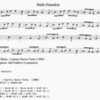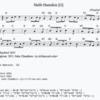Half Hannikin
Title
Half Hannikin
Digital Object
About:
HALFE HANNIKIN. AKA – "Huff Hannekin." English, Country Dance Tune (6/8 time). C Mixolydian (Chappell, Merryweather, Raven): G Major (Barnes, Sharp). Standard tuning (fiddle). ABAB (Sharp): ABC (Chappell): AAB (Barnes): AABB (Merryweather, Raven). The tune was first published by John Playford in his English Dancing Master of 1650-51, though Chappell (1859) finds the air mentioned in Sir H. Herbert's office-book of revels and plays performed at Whitehall during the Christmas season, 1622–23. Confirming that the tune is older than Playford is a recorded mention that on Sunday, Jan. 19th, 1623, Ben Jonson's masque Time Vindicated was performed, and:
The Prince did lead the measures with the French Ambassador's wife... the measures, braules, corrantos, and galliards, being ended, the masquers, with the ladies, did daunce two countrey dances, namely, 'The Soldier's Marche' and 'Huff Hammukin.'
The title “Halfe Hannikin” is possibly a corruption of honig-huchen, or ‘sweet cake’, adopted into English along with other German and Dutch words in the 16th century. Alternatively, ‘Hannikin’ may possibly derive from honniken, used in Thomas Dekker’s The Shoemaker’s Holiday(1599, Act IV, sc. 5), used to mean a ‘stupid fellow’ or ‘needy fellow’ [Wells, “Playford Tunes and Broadside Ballads,” Journal of the English Folk Dance and Song Society, vol. 3, no. 4 (Dec. 1939), pp. 259–273]. Graham Christian (2015) says "Hankin, Hannikin, Mamukin, Hanskin, and Hansken were all variants of a name of Dutch origin meaning "Little John" or "son of John" (Jo-hannes-kin), and in England it became a teasing name for a fool or clown, sometimesas "Hankin Booby"." He concludes that "Hankin [Hannikin] Booby" may have been the name of the dance or tune or both, and believes the first word of the title ('halfe') is a form of "huff", which at that time meant to swagger. Thus the instead of a half- of something, the complete title meant to 'swagger like a buffoon', fitting with the dance which is "an unusal single mixer throwing all the dancers into one merry brew together" [Christian, A Playford Assembly, 2015, p. 43].
The Prince did lead the measures with the French Ambassador's wife... the measures, braules, corrantos, and galliards, being ended, the masquers, with the ladies, did daunce two countrey dances, namely, 'The Soldier's Marche' and 'Huff Hammukin.'
The title “Halfe Hannikin” is possibly a corruption of honig-huchen, or ‘sweet cake’, adopted into English along with other German and Dutch words in the 16th century. Alternatively, ‘Hannikin’ may possibly derive from honniken, used in Thomas Dekker’s The Shoemaker’s Holiday(1599, Act IV, sc. 5), used to mean a ‘stupid fellow’ or ‘needy fellow’ [Wells, “Playford Tunes and Broadside Ballads,” Journal of the English Folk Dance and Song Society, vol. 3, no. 4 (Dec. 1939), pp. 259–273]. Graham Christian (2015) says "Hankin, Hannikin, Mamukin, Hanskin, and Hansken were all variants of a name of Dutch origin meaning "Little John" or "son of John" (Jo-hannes-kin), and in England it became a teasing name for a fool or clown, sometimesas "Hankin Booby"." He concludes that "Hankin [Hannikin] Booby" may have been the name of the dance or tune or both, and believes the first word of the title ('halfe') is a form of "huff", which at that time meant to swagger. Thus the instead of a half- of something, the complete title meant to 'swagger like a buffoon', fitting with the dance which is "an unusal single mixer throwing all the dancers into one merry brew together" [Christian, A Playford Assembly, 2015, p. 43].
Ballads using this tune:
Sources:
Barnes (English Country Dance Tunes), 1986.
Chappell (Popular Music of the Olden Time, vol. 1), 1859; p. 302.
Merryweather (Tunes for English Bagpipes), 1989; p. 40. Raven (English Country Dance Tunes), 1984; p. 41 (a facsimile copy of the Playford original).
Sharp (Country Dance Tunes, Set 7), 1916; no. 16, pp. 17–18.
The Traditional Tune Archive
Chappell (Popular Music of the Olden Time, vol. 1), 1859; p. 302.
Merryweather (Tunes for English Bagpipes), 1989; p. 40. Raven (English Country Dance Tunes), 1984; p. 41 (a facsimile copy of the Playford original).
Sharp (Country Dance Tunes, Set 7), 1916; no. 16, pp. 17–18.
The Traditional Tune Archive
Collection
Citation
“Half Hannikin,” Execution Ballads, accessed February 24, 2026, https://omeka.cloud.unimelb.edu.au/execution-ballads/items/show/1295.


